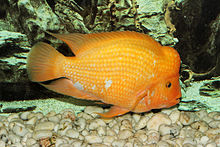Amphilophus citrinellus
| Amphilophus citrinellus | |
|---|---|
 |
|
| Amphilophus citrinellus | |
| Scientific classification | |
| Kingdom: | Animalia |
| Phylum: | Chordata |
| Class: | Actinopterygii |
| Order: | Perciformes |
| Family: | Cichlidae |
| Subfamily: | Cichlasomatinae |
| Genus: | Amphilophus |
| Species: | A. citrinellus |
| Binomial name | |
|
Amphilophus citrinellus (Günther, 1864) |
|
Amphilophus citrinellus is a large cichlid fish endemic to the San Juan River and adjacent watersheds in Costa Rica and Nicaragua. In the aquarium trade A. citrinellus is often sold under the trade name of Midas cichlid. A. citrinellus are omnivorous and their diet consists of plant material, molluscs and smaller fish. The species is closely related to but not to be mistaken as Amphilophus labiatus.
Midas cichlids are heavily built and are capable of standing up to any other aquarium-sized cichlid in fights over territory. They have powerful jaws, sharp teeth and a physical size advantage in comparison to other aquarium species. Therefore, the aggressivity of Midas cichlids should not be underestimated and cohabitants should be chosen carefully in an aquarium setting.
Considerable debate over the taxonomic status of A. citrinellus began soon after the discovery of this species in the nineteenth century and continued throughout the twentieth century. A multivariate approach to treatment of anatomical characters has facilitated the discrimination among very similarly shaped species, aided by behavioral and ecological evidence. Multiple species of this group have been identified and verified by genomic and evidence in volcanic crater lakes Apoyo and Xiloá. The genetic evidence from Apoyo supports a hypothesis that the six known species of the lake evolved via sympatric speciation. A few to perhaps several dozen species fitting the biological species concept are considered to exist among what has historically been called A. citrinellus, the great majority of which have not been described to date. The nine most recently described members of this species complex are considered endemic to their respective small, volcanic crater lakes.
...
Wikipedia
